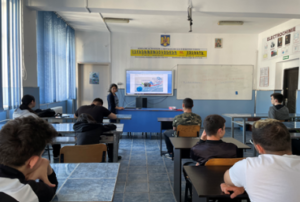News . Best Practices Involvement saves the planet

This report presents an open schooling initiative about CONNECT – Horizon 2020 Science with and for Society, which was developed at the Energy Technological High School “Elie Radu” Ploiesti, by teacher Soare Elena, between 20/10/2022 and 12/06/2023. The activities included a science professional (-). It was supported by Valahia University in Targoviste, Romania. This work was presented previously HERE.
Care: Students were interested in learning about the negative environmental effects of plastic waste currently choking the planet, plastics disposal scenarios, and the advantages of using bioplastics over conventional plastics. Students who participated in the activities are aged 17-18, twelfth grade, 26 in number, basic field: natural resources and environmental protection.
Know: Based on the knowledge gained and by solving the tasks in the worksheets presented in the project, students developed skills of analysis and awareness of the negative effects of plastic on the environment and offered the opportunity to propose ways to reduce pollution with this type of waste.
Do: In the end, students made informative leaflets about the negative effects of plastics, drawings and models about the need to reduce plastic use, thematic articles in the school magazine. Family members were also involved in the activities, together carrying out activities to reduce pollution and raise awareness of the transition from linear plastic consumption to circular consumption.
Findings related to the Open Schooling approach: The activity is framed in the curriculum, within the environmental protection module, according to the qualification of the class that participated in the project. It was a challenging activity, which managed to actively involve students, families and members of the local community in collecting a large amount of plastics at school level, and from its capitalization was purchased planting material for the green space of the school. Open schooling could be challenging for other teachers as it provides opportunities to raise awareness of the need to reduce plastic use and build an environmental awareness that it passes on to students.
Student results: Students were actively involved and challenged in obtaining bioplastics from corn starch, acetic acid and glycerine and in selectively collecting a large amount of plastic mass. As an example, one student mentioned, “If we all use so much plastic and don’t stop, then we’re going to suffocate the Earth as fast as possible.”